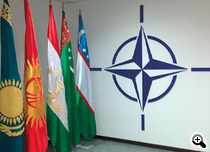EurasiaNet.org reports that according to a new survey by the American firm Gallup, Central Asians are more likely to see NATO as more of a threat than as protection.
The survey reportedly polled residents of all the ex-Soviet republics except for Turkmenistan and Uzbekistan.
All of the Central Asian states saw NATO as more of a threat than as protection. Tajikistan was the most anti-NATO state, with 34 percent seeing it as a threat and eight percent as protection. Next is Kyrgyzstan, at 19 percent protection and 30 percent threat; then Kazakhstan, 25 percent protection and 31 percent threat.
It's hard to imagine what NATO would possibly threaten in Central Asia. And while it's tempting to attribute this to exposure to Russian narratives about NATO, Tajikistan is the least Russian-speaking of all these countries, and Kazakhstan the most Russian-speaking, so that explanation isn't satisfying.
Note that NATO closed down its Central Asia liaison office in Tashkent last year, deciding that it would henceforth operate all of its modest cooperation programs in the region from Brussels.
Armenia also had a mostly negative response, with 20 percent saying NATO is a threat and only eight percent as a protection. Armenia's government makes not-insignificant efforts to maintain real cooperation with NATO, in spite of being a member of the NATO rival Collective Security Treaty Organization. But the fact that the only NATO country on Armenia's border is Turkey no doubt colors public opinion on the alliance.
Aside from the NATO member countries (the Baltic states), the country most positively disposed toward the Western alliance was Georgia, with 37 percent of respondents seeing it as protection and only eight percent as a threat.
The only other non-Baltic ex-Soviet state where respondents were more likely to see NATO as protection instead of a threat was Azerbaijan, by a 21 percent to 16 percent margin. Azerbaijan is also the most indifferent country in the region to NATO, with a full 44 percent of those polled saying it is neither a threat nor a protector.




